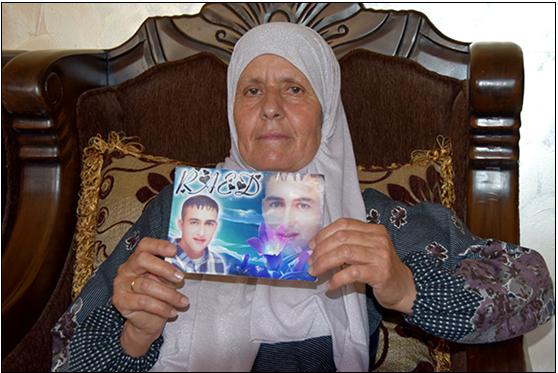According to figures from the Israel Prison Service (IPS), on June 30 of this year, Israel was holding some 5,300 Palestinian residents of the West Bank as “security detainees” or prisoners in incarceration facilities. With the exception of Ofer Prison, all the facilities used to hold Palestinians are located inside Israel.

Na’ama Handi with photo of her son Raed whom she has not seen since the end of 2017 (Photo: B’Tselem)
Residents of the occupied West Bank who wish to visit their loved ones have to overcome bureaucratic hurdles in order to secure permission from the relevant authorities – the Civil Administration, the IPS and the Israel Security Agency (“Shin Bet”). After permission is received, the visits themselves entail a long day of traveling due to countless inspections and protracted delays.
First, the residents must apply for a permit to enter Israel through the office of the International Committee of the Red Cross, which has been responsible for coordinating between the visitors, the Civil Administration and the IPS since 1969. The Civil Administration issues permits to enter Israel for a prison visitation if the visitors are first-degree relatives – fathers, mothers, grandparents, spouses, children or siblings. The permits are usually valid for a year. Other relatives are only permitted to visit prisoners in exceptional cases, when the Israeli authorities acknowledge “humanitarian grounds” for the visit.
However, the Civil Administration limits first-degree relatives, too. If the Shin Bet classifies an applicant as denied entry to Israel “on security grounds,” he or she can only receive a “prison visitation permit for denied persons” – a special permit usually valid for 45 days and for a single visit – or none at all. In addition, all men between the ages of 16 and 35 are automatically denied an annual visit permit. Some are given a special single-visit permit. In practice, even relatives who receive an annual permit are not allowed to visit on a regular basis.
The IPS allows the families of Palestinian prisoners (political and criminal alike) incarcerated in Israel only one visit a month. Although regulations state that criminal prisoners are entitled to meet relatives under less stringent conditions than “security prisoners,” Palestinian visitors from the West Bank (excluding East Jerusalem) are only permitted to come with transportation organized by the Red Cross on prescheduled dates, and all visits are held under the strict conditions that apply to political prisoners.
The journey takes an entire day. All visitors, regardless of their age or health, must come to arranged meeting points early in the morning. They are then taken in buses hired by the Red Cross to the final checkpoint before entering Israel, where they undergo a security inspection that entails a lengthy delay, as Palestinian workers employed in Israel or in settlements in the “seam zone” also cross at those hours. The visitors then board new buses with Israeli license plates, also hired by the Red Cross. From the moment the buses leave the checkpoint; the security forces forbid opening the doors until arrival at the incarceration facility, even though the journey may take several hours. At the facility, the visitors undergo another security inspection, including a body search.
After undergoing this entire ordeal, the relatives get to see their loved ones behind a transparent partition and talk to them through a telephone receiver for 45 minutes. Prisoners are allowed to request a private meeting without a partition, but the prison authorities very rarely approve such requests.
According to B’Tselem: “With one exception, all the prisons in which Israel holds Palestinians are located within its sovereign territory and not in the Occupied Territories. Holding residents of the Occupied Territories within Israel violates international humanitarian law, which prohibits the transfer of civilians – including detainees and prisoners – from the occupied area to the territory of the occupying power. This ongoing breach of the law gravely violates the rights of Palestinians from the Occupied Territories to visit their relatives in prison with adequate frequency and under reasonable conditions. In many cases, they are denied the right to visit them altogether. The hardship entailed in visiting relatives imprisoned in Israel is just one example of the exhausting routine of occupation that Palestinians face daily.”
Full report by B’Tselem: https://www.btselem.org/detainees_and_prisoners/20180809_prisoners_visits


